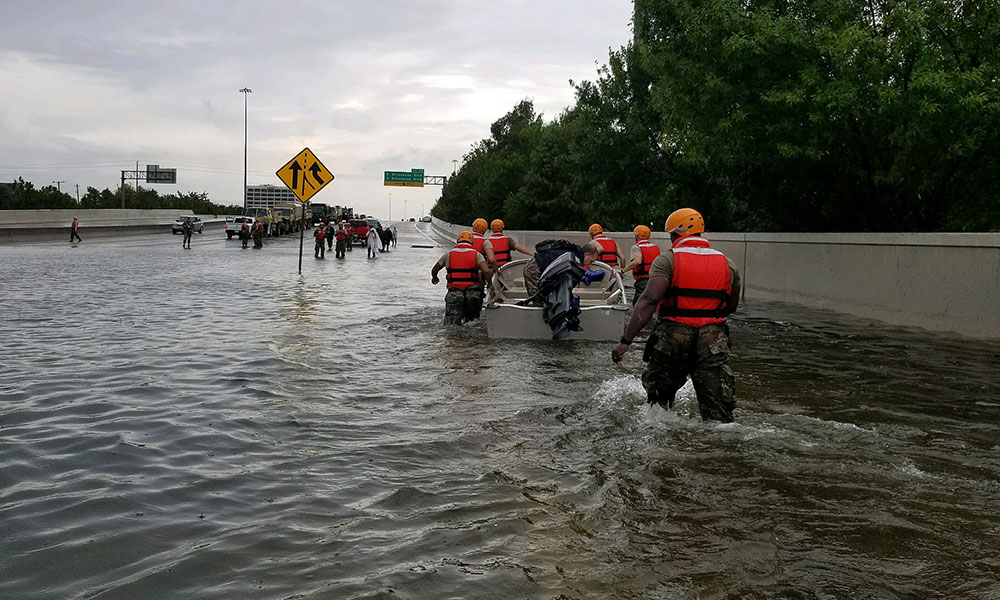
Associations Size Up Harvey’s Economic Impact
With flooding from Hurricane Harvey still inundating southeastern Texas, it will likely be weeks or longer before its devastation is fully understood. But groups in fields as diverse as insurance, agriculture, construction, and oil production are keeping an eye on the economic issues the disaster has created for the region and beyond.
As Hurricane Harvey continued to soak the Texas coast Tuesday, it was hard to come by official estimates of the storm’s impact. But it’s clear that the recovery will be long and difficult—and the economic consequences far-reaching.
“We need to recognize it will be a new normal, a new and different normal for this entire region,” Texas Gov. Greg Abbott said, according to The New York Times.
Some preliminary assessments of the storm’s economic impact have started to emerge from organizations in a variety of sectors:
Insurance
Although it hasn’t released an official estimate, the Insurance Information Institute is predicting that flood damage from Harvey is likely to rival damage caused by Hurricane Katrina in 2005.
“It could be a flood loss like Katrina because of the amount of water that’s coming in … not as much wind as it will be water,” Loretta Worters, a spokesperson for the institute, told Reuters.
Flood insurance losses from Katrina paid by the National Flood Insurance Program, the primary insurance program covering flood damage, totaled more than $16 billion, according to the institute. A 2016 institute survey found that only 14 percent of homeowners have a flood insurance policy.
Meanwhile, legal groups are warning that a new Texas law that takes effect Friday will make it harder for consumers to sue insurance companies that delay or fail to pay on claims. In comments to the Dallas News, Will Adams, vice president of legislative affairs for the Texas Trial Lawyers Association, said that “everything about this bill makes it harder for policyholders to hold insurance companies accountable.”
Texans for Lawsuit Reform, a main proponent of the new law, said in a statement that most homeowners will not be affected because the law applies only to litigation and doesn’t change the regular claims process.
Construction
One of the factors that helped Louisiana get back on its feet after Hurricane Katrina was a major influx of temporary workers who assisted with reconstruction efforts. But Harvey arrived during a period of worker shortages and skills gaps, and associations have been working overtime to draw new faces to the construction industry.
The problem extends nationwide and could be exacerbated by the storm, a Slate piece notes. According to recent National Association of Home Builders statistics, labor shortages were particularly pronounced among framing crews, carpenters, bricklayers, concrete workers, and drywall installation workers—with each line of work reporting shortage rates above 60 percent.
Oil and Gas
The Gulf of Mexico is the source of 20 percent of American crude oil production, and refineries on the Texas coast account for about a third of U.S. refining capacity. Disruptions from Harvey are expected to be felt far beyond Texas.
Don Briggs, president of Louisiana Oil & Gas Association, told the Daily Advertiser that “the big factor is what refineries can do to maintain refining capacity.”
There’s likely to be at least short-term pain at the pump. Gas prices are likely to rise by 10 t0 20 cents per gallon, GasBuddy.com petroleum analyst Patrick DeHaan told USA Today.
Agriculture
The Texas cattle industry is the country’s largest, and the impact of the storm could prove particularly painful for ranchers, who have struggled to keep their herds contained and safe during the flooding.
The Texas and Southwestern Cattle Raisers Association says it is “working with state and local response agencies to coordinate relief and support efforts, and does have Special Rangers in the region to assist producers.” But with weather conditions still in flux, ranchers and others in the agricultural sector are unsure of the full impact of the storm.
“A significant amount of cattle raisers have been impacted by this,” Jeremy Fuchs, a spokesperson for the association, told Bloomberg. “We suspect there are going to be lots of fences down, lots of cattle out, and lots of work to be done to rebuild the infrastructure and recover those animals.”
(The National Guard/Flickr)






Comments